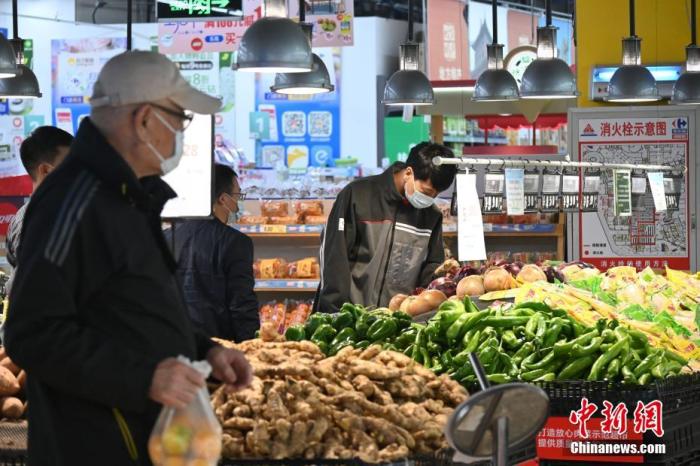China News Service, Beijing, December 9th (Reporter Wang Enbo) The National Bureau of Statistics of China announced on the 9th that in November, China's Consumer Price Index (CPI) rose 2.3% year-on-year, an increase of 0.8 percentage points from the previous month.
According to the official, the year-on-year increase has expanded considerably, and in addition to being affected by the new price increase this month, it is mainly affected by the lower base in the same period last year.
Data map: In a large supermarket in Shijiazhuang City, Hebei Province, citizens are buying vegetables.
Photo by China News Agency reporter Zhai Yujia
Specifically, in November, food prices changed from a 2.4% year-on-year decrease in the previous month to an increase of 1.6%, affecting the CPI increase by about 0.30 percentage points; non-food prices rose by 2.5% year-on-year, an increase of 0.1 percentage points from the previous month, affecting the increase in CPI About 2.04 percentage points.
In food, the price of pork fell by 32.7%, which was 11.3 percentage points lower than the previous month; the price of fresh vegetables rose by 30.6%, which was an increase of 14.7 percentage points from the previous month.
According to estimates, of the 2.3% year-on-year increase in November, the carry-over impact of price changes last year was approximately 0.6 percentage points, an increase of 0.4 percentage points from the previous month; the impact of the new price increase was approximately 1.7 percentage points, an increase of 0.4 percentage points from the previous month percentage point.
From a month-on-month perspective, due to the combined effects of seasonal factors, rising costs and the spread of epidemics, the CPI rose by 0.4% in November, a decrease of 0.3 percentage points from the previous month.
Among them, food prices rose by 2.4% month-on-month, an increase of 0.7 percentage points from the previous month, affecting the CPI increase by about 0.43 percentage points.
Non-food prices have turned unchanged from a 0.4% increase last month.
In food, affected by factors such as seasonal growth in consumer demand and short-term tight supply of fat pigs, the price of pork has changed from a decline to an increase, rising by 12.2%. Various localities have taken multiple measures to ensure the supply of “vegetable baskets”. The increase in vegetable prices dropped sharply by 9.8 percentage points from the previous month.
Wen Bin, chief researcher of China Minsheng Bank, analyzed that the rapid increase in food prices led to a rebound in the current CPI.
On the one hand, food prices fell by 2% year-on-year in November last year, forming a low base; on the other hand, seasonal factors have a greater impact on food prices. Although pork prices fell by 32.7% year-on-year, the decline narrowed by 11.3 percentage points, but due to demand Increase and tight supply, up 12.2% month-on-month, hitting a recent high.
Wen Bin said that CPI is greatly affected by base factors, food prices and price transmission. Future trends need to be further observed and confirmed. However, it is still in a moderate and controllable range and does not pose a major constraint on monetary policy.
(over)

